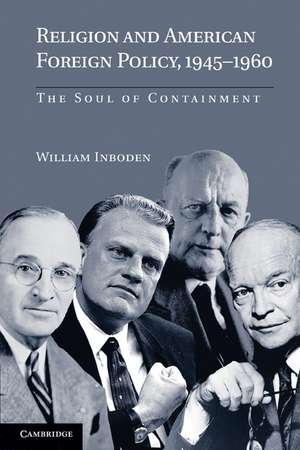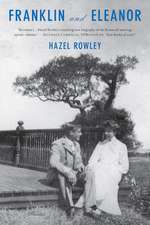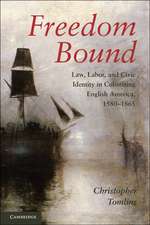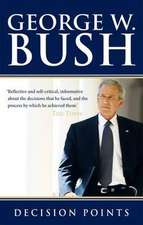Religion and American Foreign Policy, 1945–1960: The Soul of Containment
Autor William Inboden, IIIen Limba Engleză Paperback – 30 mar 2010
| Toate formatele și edițiile | Preț | Express |
|---|---|---|
| Paperback (1) | 399.50 lei 6-8 săpt. | |
| Cambridge University Press – 30 mar 2010 | 399.50 lei 6-8 săpt. | |
| Hardback (1) | 755.87 lei 6-8 săpt. | |
| Cambridge University Press – 24 aug 2008 | 755.87 lei 6-8 săpt. |
Preț: 399.50 lei
Nou
Puncte Express: 599
Preț estimativ în valută:
76.45€ • 83.37$ • 64.46£
76.45€ • 83.37$ • 64.46£
Carte tipărită la comandă
Livrare economică 24 aprilie-08 mai
Preluare comenzi: 021 569.72.76
Specificații
ISBN-13: 9780521156301
ISBN-10: 0521156300
Pagini: 370
Dimensiuni: 159 x 227 x 23 mm
Greutate: 0.57 kg
Editura: Cambridge University Press
Colecția Cambridge University Press
Locul publicării:New York, United States
ISBN-10: 0521156300
Pagini: 370
Dimensiuni: 159 x 227 x 23 mm
Greutate: 0.57 kg
Editura: Cambridge University Press
Colecția Cambridge University Press
Locul publicării:New York, United States
Cuprins
Introduction; Part I: 1. Hopes deferred: Protestants and foreign policy, 1945–1952; 2. Unity dissolved: Protestants and foreign policy, 1953–1960; Part II: 3. The 'real' Truman Doctrine: Harry Truman's theology of containment; 4. To save China: Protestant missionaries and Sino-American relations; 5. Guided by God: the unusual decision-making of Senator H. Alexander Smith; 6. Chosen by God: John Foster Dulles and America; 7. Prophet, priest, and president: Dwight D. Eisenhower and the New American Faith; Afterword.
Recenzii
'Inboden understands both foreign policy and religion, a rare combination. In addition, he does not condescend to evangelicals, gets John Foster Dulles right (no easy task, given the stereotypes of the dour puritan) and even gets Reinhold Niebuhr right (no easy task either, given Niebuhr's murky prose). This is an essential book for historians of recent foreign policy and students of the contemporary religious scene.' Leo Ribuffo, George Washington University
'William Inboden presents an illuminating and insightful account of how mainline Protestant theology not only provided rhetoric but also helped shape the substance of American Cold War policies under both Truman and Eisenhower.' George Marsden, author of A Short Life of Jonathan Edwards
'William Inboden's well-researched and carefully argued study documents the various ways that religion functioned powerfully as support for American participation in the Cold War and also its multiple uses as an instrument of battle in that conflict. Without denying the importance of military, economic, or political motives for post-war American foreign policy, Inboden shows how decisively religious factors worked to shape the nation's stance toward the world. This excellent book is important for clarifying a critical period in American history but also for providing perspective on the religious entanglements of more recent international politics.' Mark A. Noll, University of Notre Dame
'William Inboden has written a pioneering and profusely researched study into a core component of America's post-war foreign policy. His book is essential reading for scholars, students, and decision makers interested in how America looks at, and interacts with, the world.' Michael B. Oren, Georgetown University and author of Power, Faith, and Fantasy: America in the Middle East, 1776 to the Present
'William Inboden is in the forefront of a rising generation of scholars who are fundamentally recasting our understanding of the role of religion in Cold War America. In this richly researched and gracefully written account, Inboden documents the myriad ways that American faith communities shaped and were shaped by the nearly five-decade stand-off between Washington and Moscow. Essential reading for students of both religion and diplomacy in modern America.' David M. Kennedy, Stanford University
'William Inboden has done something remarkable: he has said something genuinely new about one of the most heavily mined periods of American foreign policy. His thoughtful, rigorous discussion of the role of religion in early Cold War foreign policy reminds us of two fundamental truths. First, that religion is a powerful factor, across party lines, in how Americans see the world. And second, that religion never offers simple lessons about what kind of foreign policy America should pursue.' Peter Beinart, author of The Good Fight: Why Liberals - and only Liberals - Can Win the War on Terror and Make America Great Again
'Inboden reads history with clear eyes and opens ours to the fact that diplomatic theology and theological diplomacy mattered far more to those who conducted American foreign policy than those who have studied it have hitherto understood.' Peter Feaver, Duke University
'Carefully researched and well-documented.' Church Times
'The author's evidence clearly validates his claim that religion shaped the American Cold War world view, and this book is essential reading for anyone who wishes to understand the ideological and spiritual dimensions of the conflict.' Angela M. Lahr, Journal of Church and State
'… excellent overviews of the larger story of religion in the early Cold War years and its influence on US foreign policy. Inboden illustrates his arguments with an in-depth examination of key personalities.' James C. Wallace, Journal of Cold War Studies
'William Inboden presents an illuminating and insightful account of how mainline Protestant theology not only provided rhetoric but also helped shape the substance of American Cold War policies under both Truman and Eisenhower.' George Marsden, author of A Short Life of Jonathan Edwards
'William Inboden's well-researched and carefully argued study documents the various ways that religion functioned powerfully as support for American participation in the Cold War and also its multiple uses as an instrument of battle in that conflict. Without denying the importance of military, economic, or political motives for post-war American foreign policy, Inboden shows how decisively religious factors worked to shape the nation's stance toward the world. This excellent book is important for clarifying a critical period in American history but also for providing perspective on the religious entanglements of more recent international politics.' Mark A. Noll, University of Notre Dame
'William Inboden has written a pioneering and profusely researched study into a core component of America's post-war foreign policy. His book is essential reading for scholars, students, and decision makers interested in how America looks at, and interacts with, the world.' Michael B. Oren, Georgetown University and author of Power, Faith, and Fantasy: America in the Middle East, 1776 to the Present
'William Inboden is in the forefront of a rising generation of scholars who are fundamentally recasting our understanding of the role of religion in Cold War America. In this richly researched and gracefully written account, Inboden documents the myriad ways that American faith communities shaped and were shaped by the nearly five-decade stand-off between Washington and Moscow. Essential reading for students of both religion and diplomacy in modern America.' David M. Kennedy, Stanford University
'William Inboden has done something remarkable: he has said something genuinely new about one of the most heavily mined periods of American foreign policy. His thoughtful, rigorous discussion of the role of religion in early Cold War foreign policy reminds us of two fundamental truths. First, that religion is a powerful factor, across party lines, in how Americans see the world. And second, that religion never offers simple lessons about what kind of foreign policy America should pursue.' Peter Beinart, author of The Good Fight: Why Liberals - and only Liberals - Can Win the War on Terror and Make America Great Again
'Inboden reads history with clear eyes and opens ours to the fact that diplomatic theology and theological diplomacy mattered far more to those who conducted American foreign policy than those who have studied it have hitherto understood.' Peter Feaver, Duke University
'Carefully researched and well-documented.' Church Times
'The author's evidence clearly validates his claim that religion shaped the American Cold War world view, and this book is essential reading for anyone who wishes to understand the ideological and spiritual dimensions of the conflict.' Angela M. Lahr, Journal of Church and State
'… excellent overviews of the larger story of religion in the early Cold War years and its influence on US foreign policy. Inboden illustrates his arguments with an in-depth examination of key personalities.' James C. Wallace, Journal of Cold War Studies
Notă biografică
Descriere
This book is about the religious dimensions of American leadership's fight against communism during the Cold War.












